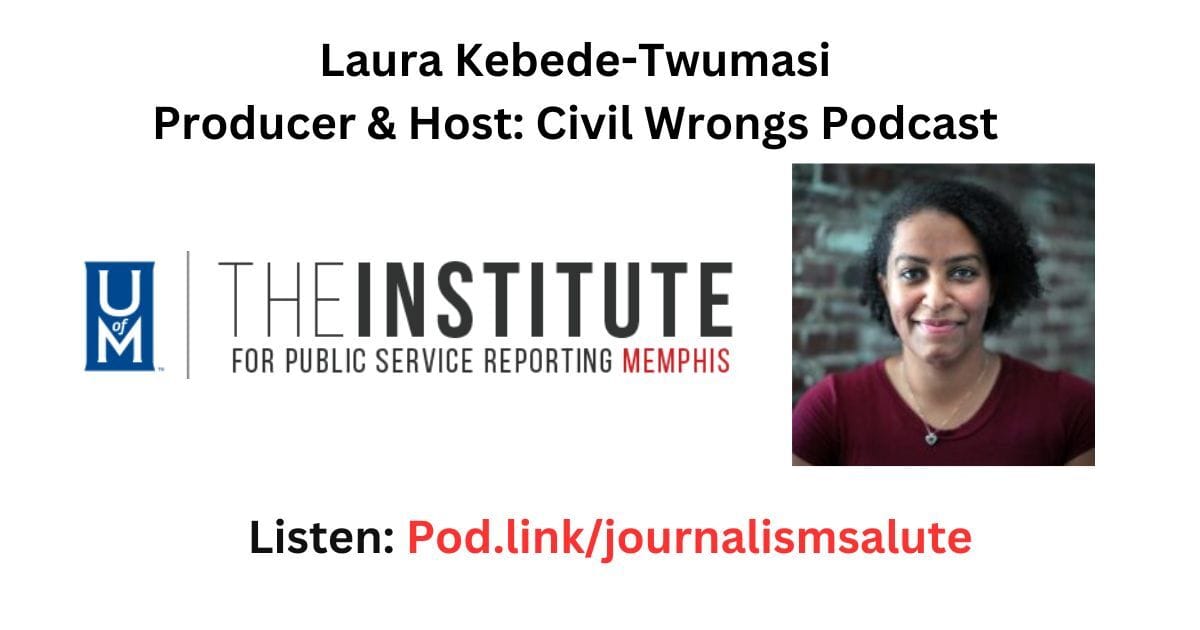I’m Luke DiStefano and I’ll be helping Mark with the newsletter for a while. I’m a student at The College of New Jersey majoring in Journalism & Professional Writing, with a minor in Creative Writing. Outside of this newsletter, I am the Nation & World editor at The Signal newspaper, and I am a published poet—with my poetry collection “the gentlemen gallery” available on Amazon.

Laura Kebede-Twumasi is a fascinating case, as she has truly successfully married her love for the historical and the current through her many journalistic ventures, but especially when it comes to the Civil Wrongs podcast.
I find this to be especially crucial as a lot of journalism today is merely proactive, and more often than not there can be current insights to glean from retroactive journalistic thinking. By connecting historical mistakes to our present predicaments, we can have a more complete grasp over how events came to pass.
This week, Mark Simon talked to Laura, a journalist and public historian based in Virginia. She was also a journalist in residence and professor at the University of Memphis where she got her master's through Report for America and had previous experience at The Richmond Times Dispatch, and an education reporter for Chalkbeat.
During her time in Memphis, Laura and The Institute for Public Service Reporting launched Civil Wrongs, a podcast connecting past to present—with a specific focus on historical atrocities. It investigates lynching deaths related to civil rights work and racially motivated massacres. It has spanned 21 episodes and was a collaborative effort with students in social justice classes at the school. It will continue on in the near future.
“So around 2017-ish I started volunteering with a local organization called Lynching Sites Project of Memphis. This was an interracial intergenerational group of folks who felt challenged when Brian Stevenson from the Equal Justice Initiative came to Memphis and he said in Shelby County that there's the most lynchings in any other county in Tennessee,” she said in regards to her other forays into tying history into current events.
“And he basically kind of challenged the group to remember them, and have some sort of public remembrance of them. That's a responsibility or a weight that the county should consider,” she said. “I started volunteering with them and I felt like I learned so much from that group of people, not only how to just do public remembrance projects, but also the interpersonal, difficult, courageous conversations about race in America and the legacy of racism. And so I saw them as a way of my own personal journey of figuring out what it looks like for America to heal from its past.”
Journalists are often called to maintain a journalistic integrity which is only truly held when one is objective in their reporting. However the downside of this is that often times those journalists who are personally affected by an issue will refuse to cover it on the basis of objectivity—even when they are arguably the most qualified and knowledgeable on the matter.
“My emotions aren't impacting the verification of whatever is being included in the story. But if it's all verified, that emotional part of it is part of the story. There's no way that you can truly take that out. So that's kind of where I land. And it's almost as if, you would say, I should have that kind of reaction to it when I'm listening to it,” she said on the nature of journalists covering stories and topics that are personal to them.
It’s definitely important to consider her answer in context of one’s own journalistic decisions, as there is indeed a way to maintain objective truth while still covering those topics and stories that are personal to us. Laura proves that objectivity doesn't have to mean apathy.
When asked about any advice she had for journalism students or teachers, Laura said “to put the community's information needs first. I think so often we will defend our way of doing things. Not because it's actually beneficial to the communities that we say we aim to serve, but it's just because like that's how we've been taught to do it, or that's how we want to do it.”
As a young person involved in journalism, my biggest takeaway from this interview is simply the point of view with which she approaches her work. One quote of hers that really stuck with me was “journalism became my way to answer questions that had bugged me for a long time.”
And that’s why it’s worth listening to this episode. Perspectives such as hers are valuable in this way, as I hadn’t even realized I felt this guilt associated with the idea of covering stories close to me, as if the idea of empathy is mutually exclusive to subjectivity. Kebede-Twumasi shows us not just how that isn’t true, but all the great journalism a reporter can achieve when they let go of that idea.
Laura’s salute: Cardinal News, a non-profit newsroom in southwest Virginia.


